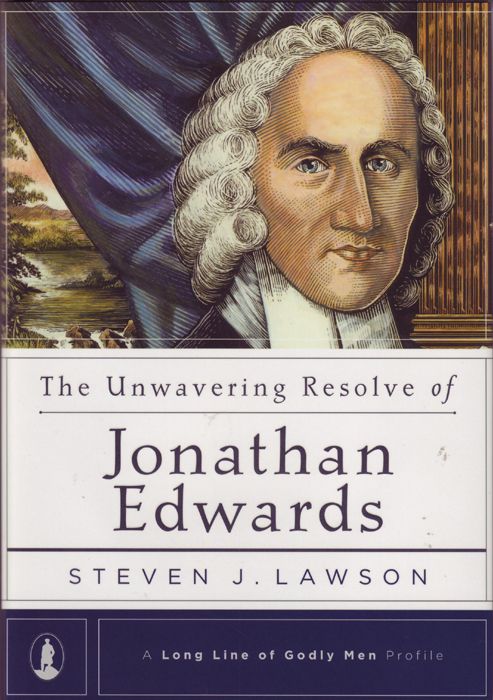 Jonathan Edwards, who lived on earth from 1703 to 1758, was a Truly Reformed follower of Jesus Christ (and an adherent of the Westminster Shorter Catechism...); he dedicated himself to glorifying and enjoying God (forever): Soli Deo gloria! Author Steven Lawson tells us Edwards lived, spoke, and wrote "Reformed theology in its English Puritan form."
Jonathan Edwards, who lived on earth from 1703 to 1758, was a Truly Reformed follower of Jesus Christ (and an adherent of the Westminster Shorter Catechism...); he dedicated himself to glorifying and enjoying God (forever): Soli Deo gloria! Author Steven Lawson tells us Edwards lived, spoke, and wrote "Reformed theology in its English Puritan form."Most who are acquainted with scripture are aware of significantly recurring numbers such as 40 and 7; "70" is another of those biblical numbers. In Genesis 46:27 we read, "all the persons of the house of Jacob that came into Egypt were seventy; Exodus 1:5 tells us, "And all the souls that came out of the loins of Jacob were seventy souls." Better known appearances of "70" in scripture include Numbers 11:16, "And The Lord said unto Moses, Gather unto me seventy men of the elders of Israel..." and Exodus 24:1 "Now he said to Moses, "Come up to the Lord, you and Aaron, Nadab and Abihu, and seventy of the elders of Israel." Luke 10:1 brings us "After this the Lord appointed seventy others and sent them on ahead of him in pairs to every town and place where he himself intended to go." Now we have Seventy Resolutions by Jonathan Edwards!
Only two centuries after the continental European Reformation of the 16th century, in order to attain "a model of a disciplined Christian life," become a better steward of time, and grow in love toward the saints, young Colonial Puritan pastor Jonathan Edwards [literally] penned 70 resolutions, "resolving," to live faithfully in particular aspects of his daily life. This happened between late summer 1722 and 17 August 1723; by then he'd graduated from Yale and was interim pastoring a Scots Presbyterian church in NYC near Wall Street. According to author Lawson, creating this type of life intention list was a conventional practice at that time.
I've read some of Edwards' original writings, mostly as class assignments, and I recently read and reviewed Steven Nichols' Heaven on Earth, but in this 21st century, I still need help condensing and clarifying Edwards' prose that's relatively wordy and ornate by contemporary standards. As an excellent, easy-to-follow organizing strategy, the author lines out for the reader how Edwards' seventy resolutions focus around a half-dozen God-focused pursuits:
• Pursuing the Glory of God.
• Forsaking Sin.
• Making Proper Use of God-Allotted Time. (This one is huge, as we'd say these days.)
• Living with All His Being for the Lord.
• Pursuing Humility and Love. I especially like, "Whenever Edwards saw sin in another person, he took inventory on his own soul to search for the same iniquity. He was deeply concerned that his observations of sins in others might produce pride in his own heart." page 81
• Making Frequent Self-Examination.
The appendix includes full text of all the resolutions along with the dates Edwards posted each one; the preamble states how by grace he'd perform the impressive resolutions: "Being sensible that I am unable to do anything without God’s help, I do humbly entreat him by his grace to enable me to keep these Resolutions, so far as they are agreeable to his will, for Christ’s sake." The resolutions themselves describe what he'd do. 66 of the 70 open with "resolved"—thus Edwards' Resolveds. This is the highly accessible type of book you'd probably want to reread, both to reacquaint yourself with the resolutions and to peruse Professor Lawson's excellent historical background and his explanations regarding the daily life and habits of colonial divine Jonathan Edwards.
It is clear Jonathan Edwards knew how to live well in both earthly and heavenly homes at one and the same time; most likely his experience as a colonial rather than as a citizen of the land where he resided helped contribute to that ability. He died a little less than two decades before the Declaration of Independence, but likely had some inkling the then-British colonies would become a sovereign nation in due time. Whether or not that was his own political bent I have no idea, but I once heard someone say, "every condition has its own gift"; living in two political economics as well as in two spiritual realms was a gift for Jonathan Edwards.
my amazon review: Jonathan Edwards' dual citizenship

No comments:
Post a Comment
thanks for visiting—peace and hope to all of us!